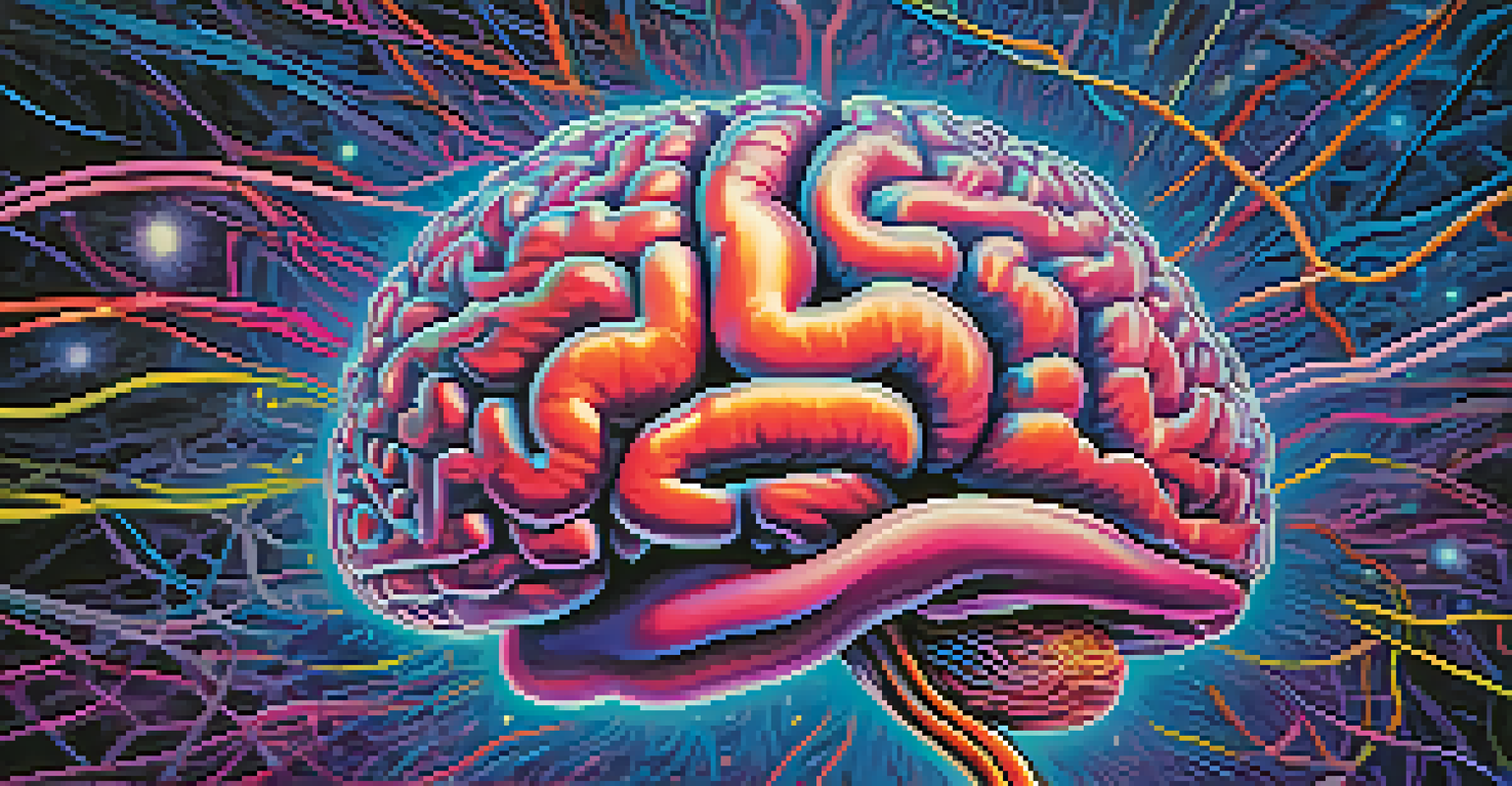Effects of Psychedelics on Memory: A Comprehensive Overview

Understanding Psychedelics: What Are They?
Psychedelics are a class of substances that alter perception, mood, and cognition. Common examples include LSD, psilocybin (magic mushrooms), and DMT. These compounds primarily affect serotonin receptors in the brain, leading to profound changes in consciousness. Understanding how they work is crucial for exploring their effects on memory.
Psychedelics may unlock the door to a deeper understanding of our consciousness and memories.
When consumed, psychedelics can create vivid hallucinations and enhanced sensory experiences. They can also lead to altered thought processes, which might impact how memories are formed and recalled. This unique interaction with the brain's chemistry sets the stage for examining their potential effects on memory.
While often associated with recreational use, recent research has shown that psychedelics may have therapeutic benefits, particularly for mental health conditions. As we delve deeper into their effects, it’s essential to keep in mind that the impact on memory can vary widely among individuals.
The Science Behind Memory Formation
Memory formation is a complex process involving several stages: encoding, storage, and retrieval. During encoding, information is transformed into a format that can be stored in the brain. This process relies heavily on neurotransmitters, such as serotonin and dopamine, which are also influenced by psychedelics.

Research indicates that psychedelics can enhance synaptic plasticity, the brain's ability to adapt and reorganize itself. This means they may facilitate the encoding of new memories or the retrieval of existing ones. However, this enhancement can lead to both positive and negative effects on memory, making it a double-edged sword.
Psychedelics Alter Memory Processes
Psychedelics can significantly impact both short-term and long-term memory by altering perception and cognitive functions.
By understanding how memory works, we can better appreciate the nuances of how psychedelics might affect our cognitive functions. This background sets the foundation for exploring the specific impacts these substances have on memory.
Psychedelics and Short-term Memory Effects
Short-term memory is the ability to hold a small amount of information in an active state for a brief period. Many users report that psychedelics can disrupt this function, leading to forgetfulness or difficulty concentrating. For instance, during a psychedelic experience, individuals might find it hard to track conversations or remember recent events.
The mind is not a vessel to be filled but a fire to be kindled.
This impairment can be attributed to the overwhelming sensory experiences and altered perception that psychedelics induce. The brain is processing so much information at once that it can struggle to form coherent memories. This can be particularly frustrating for users trying to engage in dialogue or recall specific details.
However, the impact on short-term memory may not be entirely negative. Some users report that the heightened emotional state during a trip can lead to memorable insights or revelations, even if the details are not retained. This phenomenon illustrates the complex interplay between psychedelics and memory.
Long-term Memory: Potential Benefits and Risks
Long-term memory involves the storage of information over extended periods, and psychedelics may play a unique role in this process. Some studies suggest that these substances can enhance the recall of autobiographical memories, providing users with profound insights into their past experiences. This phenomenon can be therapeutic, helping individuals process trauma or unresolved issues.
However, the potential for negative impacts on long-term memory exists as well. For example, some users may develop false memories or distorted perceptions of past events due to the altered state of consciousness induced by psychedelics. This can lead to confusion and a misrepresentation of personal history.
Therapeutic Potential of Psychedelics
Emerging research suggests that psychedelics may offer therapeutic benefits for memory-related mental health issues, such as PTSD.
Ultimately, the relationship between psychedelics and long-term memory is complex and still being studied. Balancing the potential benefits with the risks is crucial for understanding how these substances can affect our mental landscape.
Therapeutic Uses of Psychedelics in Memory Treatment
Recent research has explored the therapeutic potential of psychedelics in treating various mental health conditions, particularly those involving memory. For instance, studies on PTSD have shown that psychedelics can help patients confront and reprocess traumatic memories, leading to improved mental well-being.
This therapeutic approach hinges on the idea that psychedelics can facilitate a greater understanding of one's memories. By allowing individuals to revisit and reframe their past experiences, these substances may help alleviate the emotional burdens associated with them. This process can be transformative and healing.
As the field of psychedelic research grows, more professionals are looking at how these substances can play a role in cognitive therapies. This opens up exciting possibilities for developing new treatment protocols that harness the power of psychedelics to enhance memory and emotional processing.
Individual Differences and Psychedelic Experiences
The effects of psychedelics on memory can vary significantly from person to person. Factors such as genetics, mental health history, and even one's mindset going into the experience can influence outcomes. For example, individuals with prior trauma may have more intense emotional responses, affecting how they process memories.
Additionally, the environment in which psychedelics are consumed plays a crucial role. A supportive and safe setting can enhance positive experiences, while a chaotic or unsafe environment may lead to confusion and negative memories. Understanding these individual differences is vital for both researchers and users.
Individual Variability in Effects
The experience of psychedelics varies widely among individuals, influenced by factors like genetics, mental health history, and environment.
Ultimately, recognizing that everyone's experience with psychedelics is unique can help foster a more compassionate understanding of their effects on memory. This approach encourages responsible use and highlights the importance of context in shaping our experiences.
Future Research Directions in Psychedelic Studies
As interest in psychedelics continues to grow, so does the potential for groundbreaking research. Future studies are likely to delve deeper into the specific mechanisms by which these substances affect memory and cognition. This could lead to new insights into how we understand memory itself.
Researchers are also exploring the long-term effects of psychedelics on cognitive functions, including memory. By studying how repeated use impacts brain structure and function, we can better understand the risks and benefits associated with these substances. This research is crucial for informing public policy and clinical practices.

As we stand on the cusp of a new era in psychedelic research, the possibilities are exciting. With more funding and interest, we may uncover transformative ways to use psychedelics for enhancing memory and overall mental health.